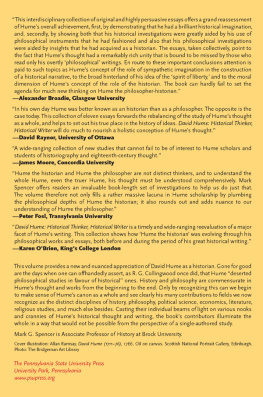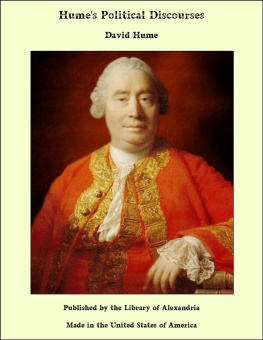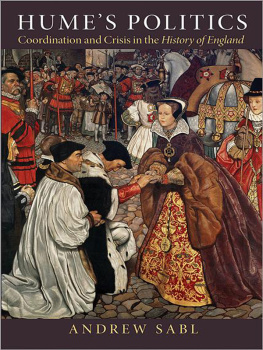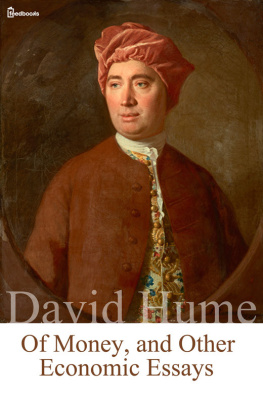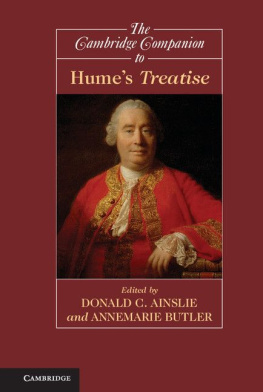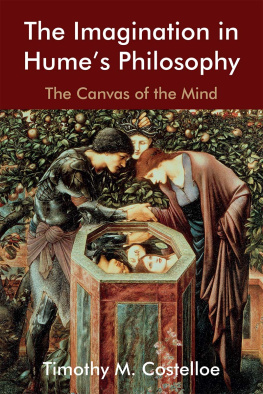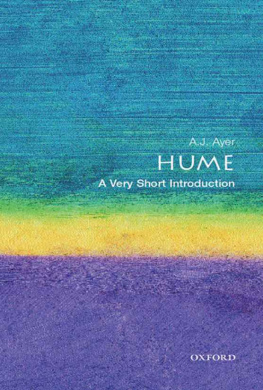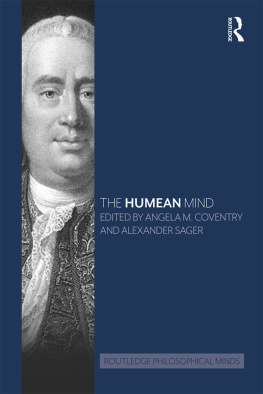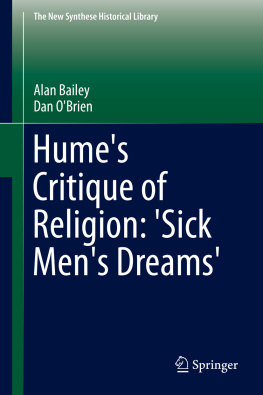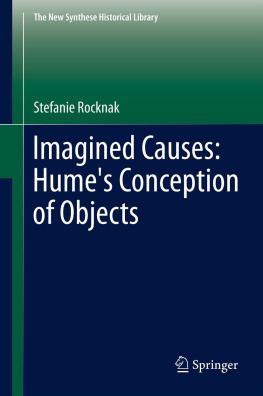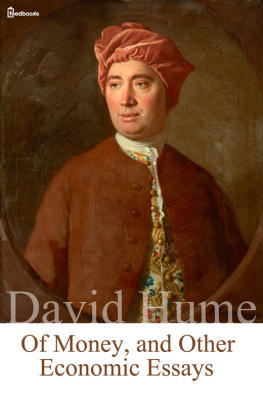Rethinking the Western Tradition
The volumes in this series seek to address the present debate over the Western tradition by reprinting key works of that tradition along with essays that evaluate each text from different perspectives.
EDITORIAL
COMMITTEE FOR
Rethinking the Western Tradition
David Bromwich
Yale University
Ian Shapiro
Yale University
Steven B. Smith
Yale University
Shannon C. Stimson
Georgetown University
David Hume on Morals, Politics, and Society
Edited by
Angela Coventry and Andrew Valls with an Introduction by
Andrew Valls
with essays by
Mark G. Spencer
Elizabeth S. Radcliffe
Frederick G. Whelan
Peter Vanderschraaf and Andrew Valls
Yale UNIVERSITY PRESS
New Haven & London
Published with assistance from the Annie Burr Lewis Fund.
Published with assistance from the Mary Cady Tew Memorial Fund.
Copyright 2018 by Yale University.
All rights reserved.
This book may not be reproduced, in whole or in part, including illustrations, in any form (beyond that copying permitted by Sections 107 and 108 of the U.S. Copyright Law and except by reviewers for the public press), without written permission from the publishers.
Yale University Press books may be purchased in quantity for educational, business, or promotional use. For information, please e-mail (U.K. office).
Set in Times Roman type by Newgen North America, Austin, Texas.
Printed in the United States of America.
Library of Congress Control Number: 2018938116
ISBN 978-0-300-20714-9 (paperback : alk. paper)
A catalogue record for this book is available from the British Library.
This paper meets the requirements of ANSI /NISO Z39.48-1992 (Permanence of Paper).
10 9 8 7 6 5 4 3 2 1
Contributors
Angela Coventry is Associate Professor of Philosophy at Portland State University.
Elizabeth S. Radcliffe is Professor of Philosophy at the College of William and Mary.
Mark G. Spencer is Professor of History at Brock University.
Andrew Valls is Associate Professor of Political Science at Oregon State University.
Peter Vanderschraaf is Professor of Philosophy at University of California Merced.
Frederick G. Whelan is Professor Emeritus of Political Science at University of Pittsburgh.
Contents
by Andrew Valls
Acknowledgments
Many thanks to Gretchen Becker, Sione Filimoehala, and James Funston for their fine work on the text and Index of Names. We are grateful as well to Bill Frucht and two anonymous reviewers for very helpful comments on the manuscript, Margaret Otzel for her guidance in preparing the manuscript, and Margaret Hogan for her excellent copyediting. We also thank the Center for the Humanities, the College of Liberal Arts, and the School of Public Policy at Oregon State University for support for the Index through a Faculty Excellence Publication Support Grant.
Introduction
ANDREW VALLS
David Hume occupies an odd position in the history of moral and political theory. On the one hand, he is often considered one of the greatest philosophers in the Western tradition, and his works are widely read, studied, and taught. Philosophers and political theorists produce a steady stream of papers, articles, and books on Humes thought, and these regularly appear or are discussed in academic journals and at professional conferences. Yet, on the other hand, scholars, particularly those interested in Humes social, moral, and political thought, sometimes complain that he is neglected or underappreciated, and that, as Amartya Sen (2011, 23) puts it, some of Humes central but more iconoclastic ideas have not been brought adequately into contemporary discussions. According to some observers, this is partially because the radical and profound nature of Humes thought is only now coming to be appreciated and absorbed. Russell Hardin (2007, vii) suggests that Humes moral psychology and his social science are highly original and are a couple of centuries ahead of their time in that almost no one grasped many of his theoretical claims until recent decades. While Hume scholarship is thriving, and recent theoretical developments put us in a better position to appreciate and engage his thought, at the same time he remains, among political theorists at least, consigned to a subordinate position in the pantheon of modern thinkers. Anthologies and textbooks that devote entire chapters to Thomas Hobbes, John Locke, and Jean-Jacques Rousseau often contain just a few brief references to Hume (for a recent example, see Ryan 2012).
For Hume enthusiasts, as Annette C. Baier (1991, vii) calls those who deeply appreciate Humes thought, this strange situation is somewhat distressing. Humes philosophy provides a sophisticated and thoroughly empirical and secular account of social and political life. From the point of view of those who are persuaded that Humes moral and political thought is profoundly right about a great many things, his relative neglect is unfortunate. It overlooks an extraordinarily rich set of texts that could otherwise inform and advance our understanding. This is part of the motivation behind the present volume: Humes work is experiencing renewed appreciation, and yet at present he still does not enjoy the status of a first-tier thinker in modern moral and (especially) political thought. This seems a propitious time to rethink Hume, and to (re)introduce him to students and scholars alike.
Part of the reason for the situation that I have described may be that Hume wrote no single work that contains the whole of his moral and political philosophy. Humes first published work was his A Treatise of Human Nature, written when he was still in his twenties and published in 173940. The Treatise contains three books: Book 1, Of the Understanding, offers an account of Humes theory of knowledge and the workings of the human mind. Central to this account is the role of the non-rational faculty of the imagination in associating certain ideas with one another. Book 2, Of the Passions, contains Humes theory of our emotional life, including the important idea of sympathy, which is the mechanism by which people come to share their emotional responses and hence their moral appraisals. Book 3, Of Morals, presents Humes moral and political theory, including his account of justice.
The Treatise is very much the work of a young man anxious to make his mark on the world. It is ambitious in scope and does not shy away from announcing new ideas boldly. In its introduction, Hume writes that he will propose a compleat system of the sciences, built on a foundation almost entirely new, and the only one upon which they can stand with any security (2007, 4). The Treatise is also a long and dense book, and sometimes seems to be making several arguments at once. Hume picks many fights and purposely provokes his reader with startling pronouncements. Among these are the famous (or, depending on ones point of view, infamous) assertions that many of our most fundamental beliefs cannot be rationally justified; that personal identity is a fiction; that pride is a virtue, and not the vice that some Christian moralists would have it; that reason is the slave of the passions; that moral distinctions are based not on reason but on a non-rational moral sense; and that justice is an artificial virtue, dependent not on God or reason but on human conventions.
As Mark G. Spencer describes in his essay, below, the Treatise did not get the reception that Hume had hoped. In his autobiographical essay, My Own Life, Hume wrote that his Treatise fell dead-born from the press, without reaching such distinction, as even to excite a murmur among the zealots (1985b, xxxiv). This was an exaggeration. The
Next page

